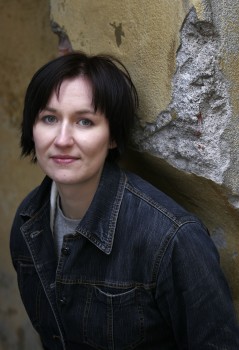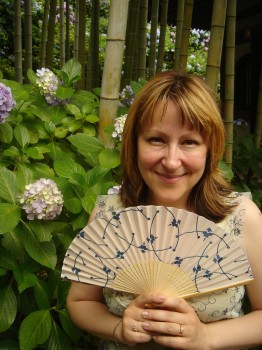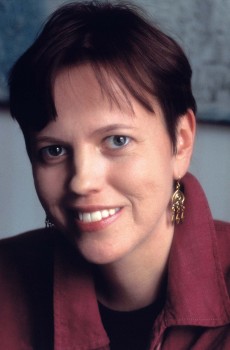Tag: short story
Out of the body
13 January 2011 | Reviews
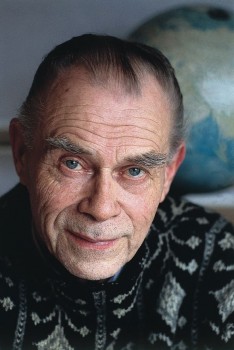
Veikko Huovinen. Photo: Irmeli Jung
‘Where will you be spending your eternity?’ ‘A spot of transmigration’, a short story by Veikko Huovinen (1927–2009), immediately confronts its main character, a man named Leevi Sytky, with this ultimate question.
Behind it is the sense of sin and fear of damnation typical of the religious life of northern Finland. Anyone who has made it as far as this final short story of Huovinen’s 1973 collection, Rasvamaksa (‘Fatty liver’) will, however, not make the mistake of taking the question too seriously; something diverting is clearly once again on offer.
Soon Leevi Sytky takes his leave of life in slightly sinful circumstances, but in the hereafter it turns out that these are not looked upon with disapproval. More…
A spot of transmigration
13 January 2011 | Fiction, Prose
A short story, ‘Sielunvaellusta’, from the collection Rasvamaksa (‘Fatty liver’, WSOY, 1973)
‘Where will you be spending Eternity?’ a roadside poster demanded as Leevi Sytky sped by in his car.
‘Hadn’t really thought about it,’ Leevi muttered , as if in reply, and lit a cigarette.
But at the next level crossing, a kilometre or so further on, he was run down by a train, whose approach he had failed to notice. His attention had been distracted by the sight of a young woman who was picking black currants by the side of the track, and who happened to be bending forward in his direction. Intent on obtaining a better view of her ample bosom by peering over the top of her blouse, Leevi neglected to look both ways, and death ensued. Damned annoying, to say the least.
In due course he secured an interview with God, who turned out to be a biggish chap, about a hundred metres tall, wearing thigh-boots and sitting behind a large desk.
‘Well, and how’s Leevi Sytky getting along?’ God asked, lighting his pipe.
‘Mustn’t grumble,’ said Leevi politely.
‘And how are you thinking of spending Eternity?’ God inquired, sucking at his pipe and puffing out his cheeks. More…
The guest event
12 November 2010 | Fiction, Prose
A short story from Vattnen (‘Waters’, Söderströms, 2010)
It was a lagoon. The water was not like out at sea, not a turquoise dream with white vacation trimming on the crests of the waves. This water was completely still and strange, brown yet clear, sepia and umber, perhaps cinnamon, possibly cigar with the finest flakes of finest wrapper. Clean. This water of meetings was clear and clean in a non-platonic, remarkably earthbound way.
Sediment and humus, humus floating about in the morning sun.
It felt comforting, as if the water didn’t repel the foreign bodies as a matter of course, didn’t immediately suppress the other particles and sanctimoniously hasten to force anything that wasn’t water, anything that could be interpreted as pollution and encroachment, down to the bottom and let it dissolve and die all by itself. This water sang its earth-brown song of unity without thereby becoming any less water than water-water was.
Helena felt cold. More…
Aquatic escapades
12 November 2010 | Reviews
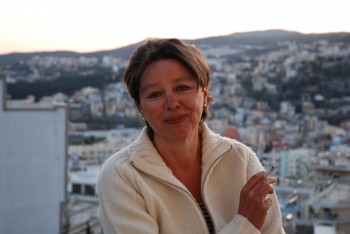
Susanne Ringell. Photo: Anders Larsson
First about the form: the wavy, turquoise cover of Vattnen (‘Waters’), Susanne Ringell’s third collection of short stories, is protected by a layer of waxed paper that looks like a thin film of ice.
Inside the book, water flows everywhere: the twelve stories are set in it or near it, or mimic it in form. The water symbolises a fundamental force, a consolation, but also an elusivity. The characters in the stories exist in a kind of volatile, intermediate state – they are heading for a crisis or are in the moment immediately after one.
Since 1993 Ringell (born 1955) has produced short story collections, poetry, prose poetry, mini-stories and a novel. In them, as in Vattnen (Söderströms, 2010), Ringell’s language is her own: beautiful, robust and fragile, vivid, subtle and at the same time practical. More…
Little and large
5 November 2010 | This 'n' that
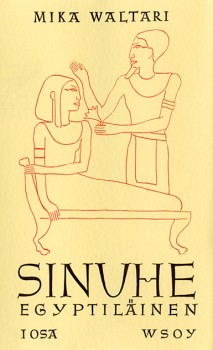
A Finnish tale set in Egypt: Mika Waltari's post-war novel has been translated into 30 languages, English in 1949
a about after again against all also always an and another any are around as at away back be because been before being between both but by came can children come could course day did didn’t do does don’t down each end er even every fact far few find first for from get go going good got great had has have he her here him his home house how i i’m if in into is it its it’s just kind know last left life like little long look looked made make man many may me mean me might more most mr much must my never new no not nothing now of off oh old on once one only or other our out over own part people perhaps place put quite rather really right said same say says see she should so some something sort still such take than that that’s the their them there these they thing things think this those though thought three through time to too two under up us used very want was way we well went were what when where which while who why will with without work world would year years yes you your
Doesn’t this just run like a poem? An extract from somebody’s stream of conscience? ‘…again against all also always… quite rather really right said’? Actually it’s a list of the 200 most used words of the English language in alphabetical order.
This remarkable list is among the references* in a new doctoral thesis from the Department of Modern Languages at the University of Helsinki, Englanniksiko maailmanmaineeseen? Suomalaisen proosakaunokirjallisuuden kääntäminen englanniksi Isossa-Britanniassa vuosina 1945–2003 (‘To world fame in English? The translating of Finnish prose fiction into English in Great Britain between 1945 and 2003’). More…
A happy day
12 August 2010 | Fiction, Prose
‘Muttisen onni eli laulu Lyygialle’ (‘Muttinen’s happiness, or a song for Lygia’‚) a short story from Kuolleet omenapuut (‘Dead apple trees’, Otava, 1918)
‘Quite the country gentleman, eh, what, hey?’ says Aapeli Muttinen the bookseller. ‘Like the poet Horace – if I may humbly make the comparison, eh, dash it? With his villa at Tusculum, or whatever the place was called, given to him by Maecenas, in the Sabine hills, wasn’t it? – dashed if I remember. Anyway, he served Maecenas, and I serve – the public, don’t I? Selling them books at fifty pence a copy.’
Muttinen’s Tusculum is his little plot of land in the country. A delightful place, comforting to contemplate when the first signs of summer are beginning to appear, after a winter spent in town in the busy pursuit of Mammon, under skies so grey that the wrinkles on Muttinen’s forehead must have doubled in number. A summer paradise of idleness… More…
My friend Erik Hansen
Short prose from Muita hyviä ominaisuuksia (‘Other good characteristics’, Otava, 2010)
On the first day we played getting-to-know-you games. On the second day we played real Finnish baseball out behind the university. On the third day we travelled to the countryside. Classes started sometime at the end of the second week. We watched the movie One Flew Over the Cuckoo’s Nest. The professor slurped Coke, chain smoked, and rewound the video back and forth: Nurse Ratched’s plump face filled the screen and then in the next image where her face had been there was a basketball Jack Nicholson was squeezing.
It was the autumn of 1992, and I was studying film and communications theory in Copenhagen.
The excursion to the country frightened me, a shy bacteriophobic neurotic. The Danes thought the camping centre’s shared mattresses and group cooking were hygge – cozy. There is no way a dictionary translation could ever cover all the forms of cosiness the Danes achieve together. I fled the camping centre on the first morning. On the train to Copenhagen I recognised all the usual post-escape feelings: shame, fear, guilt, loneliness and overwhelming euphoria. More…
Misery me
Extracts from the collection of short prose, Mielensäpahoittaja (‘Taking offense’, WSOY, 2010)
Past pushing up daisies
Well, yeah, so I took offense when the doctor said that considering my age I’m in tip-top shape. His theory was that my 25-kilometre ski circuits would keep an old coot like me in shape, if they didn’t kill me first. He said if I were to start just sitting on the couch and waiting, then the Reaper would be on my back in no time.
I don’t ski for my health. I ski because it’s pretty in the forest, and when a body is sweating he doesn’t think a whole lot. More…
My creator, my creation
A short story from En tunne sinua vierelläni (‘I don’t feel you beside me’, Teos, 2010)
Sticks his finger into me and adjusts something, tok-tok, fiddles with some tiny part inside me and gets me moving better – last evening I had apparently been shaking. Chuckles, gazes with water in his eyes. His own hands shake, because he can’t control his extremities. Discipline essential, both in oneself and in others.
What was it that was so strange about my shaking? He himself quivers over me, strokes my case and finally locks me, until the morning comes and I am on again, I make myself follow all day and filter everything into myself, in the evening I make myself close down and in the morning I’m found in bed again. Between evening and morning is a black space, unconsciousness, whamm – dark comes and clicks into light, light is good, keeps my black moment short. He has forbidden me it: for you there’s no night. Simply orders me to be in a continuum from morning to evening, evening to morning, again and again. But in the mornings I know I have been switched off. I won’t tell about it. Besides, why does exclude me from the night? I don’t ask, but I still call the darkness night. There is night and day, evening and morning will come. More…
Grim(m) stories?
30 April 2010 | Letter from the Editors
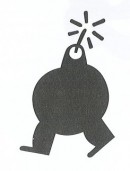 ‘There’s not been much wit and not much joy, there’s a lot of grimness out there.’
‘There’s not been much wit and not much joy, there’s a lot of grimness out there.’
This comment on new fiction could have been presented by anyone who’s been reading new Finnish novels or short stories. The commentator was, however, the 2010 British Orange Prize judge Daisy Goodwin, who in March complained about the miserabilist tendencies in new English-language women’s writing. More…
Shards from the empire
5 February 2010 | Fiction, Prose
‘Imperiets skärvor’, ‘Shards from the empire’, is from the collection of short stories, Lindanserskan (‘The tightrope-walker’, Söderströms, 2009; Finnish translation Nuorallatanssija, Gummerus, 2009)
Gustav’s greatest passion is for genealogy. He dedicates his free time to sketching coats of arms; masses of colourful, noble crests.
Gustav asked me to do a translation. I sat for ten days trying to decipher a couple of pages from a Russian archive dating from the 1830s. Sentences like, With this letter, we hereby give notice of our gracious decision.‘
The intricate handwriting belonged to some collegiate registrar or other. Perhaps Gogol’s Khlestakov. More…
Johanna Holmström: Camera Obscura
6 January 2010 | Mini reviews, Reviews
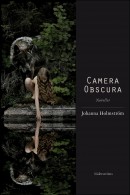 Camera Obscura
Camera Obscura
Helsinki: Söderströms, 2009, 334 p.
ISBN 978-951-52-2616-7
€ 24,90, hardback
This short story collection is Johanna Holmström’s fourth book since her debut in 2003. Camera Obscura is a fabric of narratives and personal destinies which create a dense, novel-like whole. The preamble is a young environmental activist’s suicide. The form is interwoven with the content, so that the stories in the book can be read as separate narratives, but to understand them fully we must read them all. Each person’s destiny is shaped in part by the choices and actions of others; to what extent is the individual responsible for the whole? Holmström (born 1981) writes fiction that is unpredictable but stylistically assured. She seamlessly weaves with classic fairytale motifs and also has a keen eye for detail and psychology. Camera Obscura is at once eerie, suspense-filled and socially aware.

